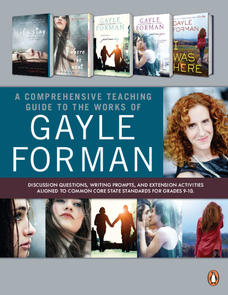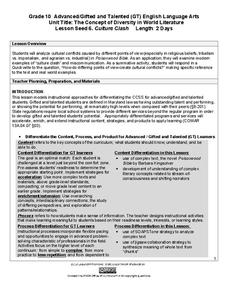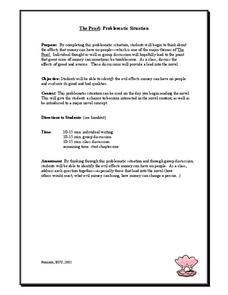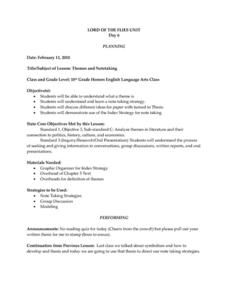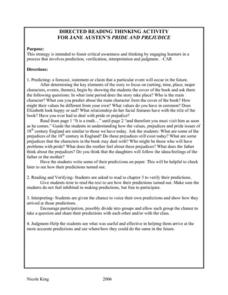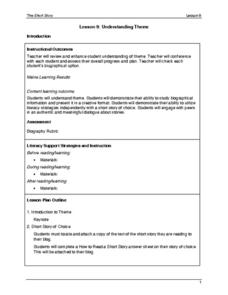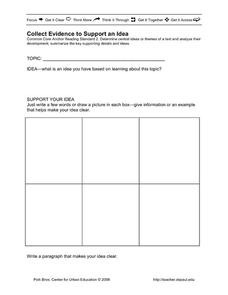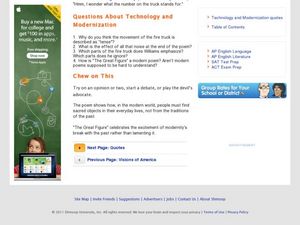Penguin Books
An Educator’s Guide to Gayle Forman
Sometimes a novel is the best way to tackle a tough topic. A helpful educator's guide for the novels of Gayle Forman discuss tough topics such as teenage suicide. Discussion questions and writing activities encourage readers to think...
National Park Service
Petrified Forest National Park
Poetry Soup, a reading and writing unit constructed by the Petrified Forest National Park, will have scholars hungry to learn about nature. The cross-content unit contains topics related to history, science, and language arts. Content...
Maryland Department of Education
The Concept of Diversity in World Literature Lesson 6: Culture Clash
To prepare for a Quickwrite on the question, "How do different points of view create cultural conflicts?" class groups draw examples of religious, cultural, and political conflicts from Things Fall Apart and The Poisonwood Bible to use...
Novelinks
Count of Monte Cristo: Professor Know‐It‐All
Kids love to be the experts! With four themes from The Count of Monte Cristo by Alexandre Dumas, small groups work together to answer specific questions addressing each theme. They then stand in front of the class and field questions...
Novelinks
Count of Monte Cristo: Concept/Vocabulary Analysis
Explore the complex themes of Alexandre Dumas' The Count of Monte Cristo with a concept and vocabulary analysis lesson plan. Lead your class in a discussion about the underlying social and historical issues surrounding the novel, as well...
Curated OER
The Pearl: Problematic Situation
Is money the root of all evil, or the answer to everyone's dreams? Analyze the role of money in John Steinbeck's The Pearl with a writing prompt where kids imagine that they have won the lottery, and must think about the ways it will...
Novelinks
The Crucible: Questioning Strategies Bloom's Taxonomy
Enrich your unit on Arthur Miller's The Crucible with a list of reading questions based on Bloom's Taxonomy. Kids answer questions and provide context for the knowledge, comprehension, application, analysis, synthesis, and evaluation...
Novelinks
Lord of the Flies: Themes and Notetaking
William Golding's Lord of the Flies is a treasure trove of symbolism and literary themes. Help your kids note the richest passages in the book with a lesson and graphic organizer. The lesson prepares kids to come up with a thesis...
Curated OER
Pride and Prejudice: Directed Reading Thinking Activity
Can you judge a book by its cover? Decide who and what Jane Austen's Pride and Prejudice is about with a prediction activity. Before reading the first three chapters of the book, kids answer questions based on their interpretation of the...
Curated OER
Pride and Prejudice: Concept/Vocabulary Analysis
Clarify the setting, literary themes, and potential vocabulary issues with a concept analysis resource. With thoughtful explanations of many parts of Jane Austen's Pride and Prejudice, the reference sheet will be a great addition to your...
Curated OER
The Boy in the Striped Pajamas: Anticipation Guide
Let your learners voice their opinions on morals and human rights with an anticipation guide for Asa Butterfield's The Boy in the Striped Pajamas. Before reading the novel, kids read several statements that encourage them to agree or...
Maine Content Literacy Project
Understanding Theme
The ninth in a fourteen-lesson series, this plan marks a sort of midpoint in a unit devoted to the study of short stories. Pupils learn about theme and work on their short story projects by adding to their blogs, checking in with the...
Maine Content Literacy Project
Process of Reading
Assist your pupils with literary analysis by discussing and exploring theme. This plan, the twelfth in a series of fourteen, builds in some time to explore theme as a class. Learners also blog about the main event in their stories and...
Polk Bros Foundation
I Can Analyze a Story or History Completely and Carefully
Start off analysis of a text with a worksheet that asks pupils to complete several tasks. Class members note down a couple of characters or people and their distinguishing traits, describe the most important event, summarize the text...
Polk Bros Foundation
I Can Comprehend a Paragraph, then a Page/Section in a Text
Help your class tackle chunks of text with a simple graphic organizer. Pupils read three paragraphs and, as they read, draw pictures in the provided boxes that demonstrate what each paragraph says. There are three boxes on the page and...
Polk Bros Foundation
Collect Evidence to Support an Idea
In order to support an idea, writers must use evidence. Your class members can prepare their evidence with this basic activity. Writers note down the topic they are learning about and their own idea. Next, they come up with information...
Polk Bros Foundation
Main Idea Analyzer
Show the connection between the main idea and supporting details with a graphic organizer. Pupils fill in the main idea of a text in the circle and the supporting ideas in the boxes connected to the circle.
NY Learns
Culture Clash: Exploring Characters within El Bronx Remembered by ECSDM
Using a character map, learners assign traits to characters from Nicholasa Mohr’s El Bronx Remembered: A Novella and Stories. In addition, groups record evidence from the stories to justify the labels and use these sheets to prepare for...
Poets.org
Ghosts and Spirits
Connect poetry to a naturally kid-friendly topic: ghosts! Draw on your class's prior knowledge of the paranormal to help them access the classic poem "Haunted House" by Henry Wadsworth Longfellow. After a fun warm-up activity describing...
Curated OER
"The Great Figure": Theme of Technology and Modernization
Learners respond to four short answer and essay questions based on themes in the poem "The Great Figure" by William Carlos Williams. The poem itself is not included, but the questions could lead to some very interesting class discussions!
National Endowment for the Humanities
Thirteen Ways of Reading a Modernist Poem
High schoolers analyze modernist poetry and the role of speaker in example poems. Learners study modernist poems from the Romanticism and Victorian periods as well as Wallace Stevens' "Thirteen Ways of Looking at a Blackbird." Using a...
Curated OER
Creating Dramatic Monologues from The Grapes of Wrath
The characters in The Grapes of Wrath come to life through an activity that asks groups to craft a dramatic monologue for a character in John Steinbeck's National Book Award and Pulitzer Prize winning novel. Writers are challenged to...
National Endowment for the Humanities
Charles Baudelaire: Poète Maudit (The Cursed Poet)
After learning the main ideas of the Decadent movement, learners work in small groups to read and translate poems by the French poet Charles Baudelaire using basic etymology skills. They then read the accurate English translations to see...
Curated OER
Acting Like a Bunch of Animals: Fables and Human
The video "The Tales of Aesop" traces for viewers the history of fables and identifies their characteristics. The class then goes to the web site "The Fisherman and the Little Fish" where they examine the classic and a modern version of...


